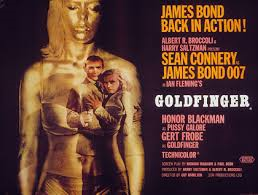This month marks the 50th anniversary of Goldfinger, the third James Bond film.
Where Dr. No and From Russia With Love were wildly successful, Goldfinger turned 007 into a phenomenon. Where the first two films were escapist, Goldfinger was outlandish — a woman killed with gold paint, a car equipped with an ejector seat, machine guns and other weaponry, a plot to invade Fort Knox and a henchman who killed people by throwing a steel-rimmed hat at them.
Audiences could not get enough. Worldwide, Goldfinger’s box office was 58 percent higher ($124.9 million) than the box office of From Russia With Love ($78.9 million). In the U.S., Goldfinger’s box office more than doubled that of its 007 predecessor ($51.1 million compared with $24.8 million).
Sean Connery had become a star as Bond, his status confirmed by having his name “above the title” in the main credits. In the first two films, it was “Starring Sean Connery” immediately after the name of the movies was shown.
As noted here before, Goldfinger was the tide that lifted all boats of the 1960s spy craze.
In the U.S., The Man From U.N.C.L.E., which had struggled in the ratings early in its run, rallied around the time Goldfinger made its American debut. By the fall of 1965, spy shows would be a major attraction on U.S. television.
In theaters, Bond’s success encouraged both wildly escapist films (the Flint and Matt Helm series) and the occasional serious, “anti-Bond” film (The Spy Who Came in From the Cold and The Ipcress File, the later produced by 007 co-producer Harry Saltzman and having several 007 production crew members aboard.).
Television commercials likewise were inspired by Goldfinger and 007. Harold Sakata, who played henchman Oddjob, starring in a series of spots for cough medicine. Butterfinger candy bars had a spot that utilized the hit John Barry-Leslie Bricusse-Anthony Newley Goldfinger title song.
The movie has been analyzed in many, many places, including five years ago at this blog. It was a difficult film to script, with Richard Maibaum, and later, Paul Dehn tackling storytelling issues in Ian Fleming’s novel. The final script turned Fleming’s longest novel into a tight film that ran below two hours.
In the 21st century, some Bond fans will say Goldfinger isn’t the best 007 movie. Some even say they’ve seen it so many times they’re really not sure they can watch it again.
Still, whatever one’s opinion, Goldfinger changed everything in the 007 universe. For years, producers Albert R. Broccoli and Harry Saltzman sought “another” Goldfinger. Richard Maibaum’s first take on Diamonds Are Forever included Goldfinger’s twin brother, an idea that was rejected.
You can make the case that various 007 films are better. Some fans cite From Russia With Love, On Her Majesty’s Secret Service, Casino Royale and Skyfall among them. But Goldfinger, because of its impact not only on the 007 franchise but on other popular entertainment, may be the most important.
Filed under: James Bond Films | Tagged: Albert R. Broccoli, Goldfinger, Goldfinger's 50th anniversary, Harry Saltzman, Honor Blackman, Ian Fleming, James Bond Films, Paul Dehn, Richard Maibaum, Sean Connery | 1 Comment »


